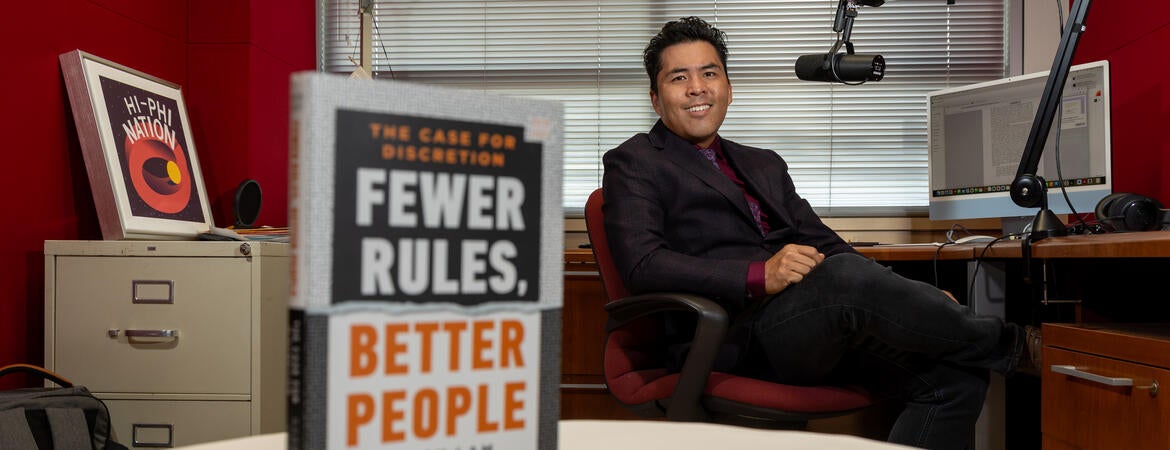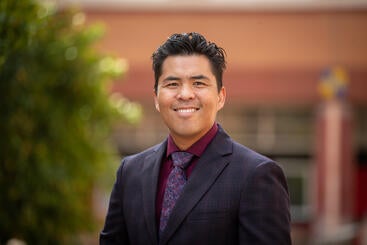
In his first book, UC Riverside Professor of Philosophy Barry Lam broaches widespread criminalization and argues to return decision-making power to “the street level.”
“The proliferation of rules and mandates is making us dumber, less moral, more deceptive, and less able to govern important institutions,” Lam argues in “Fewer Rules, Better People,” published by W.W. Norton & Company. The book is 157 pages and utilizes narrative to ground abstract ideas.
For the book, Lam left the library and sought out professionals to interview. He went into the field with a police officer, shadowed a district attorney for a week, went into a judge’s chamber, and talked to others who challenged the applications of law to see for himself how discretion in rules can help make a more just society.
“I was talking to people within the criminal justice system, prosecutors, cops, defense attorneys, judges, and the thing that they were interested in was the issue of discretion and discretionary decision making in the criminal justice system,” Lam said in a recent interview.
The past 40 years in the American criminal justice system saw the rise of a highly punitive system that saw lawmakers issue more and more mandates about how criminal justice is to be administered at the street level. During that time, lawmakers criminalized possession of various goods, implemented mandatory arrest policies for certain crimes, and instituted mandatory minimum sentencing, removing discretionary decision-making from street-level individuals who interact with citizens.
“Lawmakers are trying to take ‘arbitrariness’ out of the administration of justice, in the interest of fairness, but also punitiveness, not recognizing that mandatory sentences introduce arbitrariness, because when you give a blanket sentence, you don’t consider important moral differences between people who commit crimes, like history of mental illness or other mitigating factors," Lam said.
"Fewer Rules" argues less for fewer rules than for greater discretion applying rules, giving judges more latitude in sentencing. The book sprang from a series about crime and punishment on Lam’s acclaimed podcast, “Hi-Phi Nation,” a mix of philosophy, narrative storytelling, and investigative journalism.
“Most policing is actually not about arrests and guns; it's about figuring out how to resolve a conflict between two people who get in an altercation, or a storeowner and a shoplifter. It’s about discretionary decision-making,” Lam said. “Every single day, bureaucrats everywhere make discretionary decisions, and it brings up the question of how much power over individual lives they have and how they are constrained by legislation. That's what made me want to write this book.”
Lam said his recent move to California was another inspiration. “I see a pattern that I am very impatient and grumpy with what I take to be unnecessary bureaucracy,” Lam said. “ It kind of enrages me that a lot of people around me go along with this absurd thing that you have to do.”
Lam in his book includes a chapter on the way AI is being used to replace humans in decision-making, health, higher education, and criminal justice. He warns the potential harm caused by algorithms will increase suffering by removing human judgement, perpetuating arbitrariness. He points to standardized testing companies that have handed over their grading of essays to machine algorithms, algorithms that approve home and car loans, and those that measure risk of committing crimes in the criminal justice system.
Aside from the general nonfiction audience, Norton is also marketing the book to intro college classes.
“Eighteen-year-olds might enjoy it more than a textbook,” Lam said. Because the book’s thesis can be argued with by a reasonable person, and it comes at an issue in multiple ways, it would be useful in a composition class. Lam said, “The audience is not my peers. This is not a monograph. It's not going to be a symposium.”
Before arriving in Riverside in fall 2023, Lam was an associate professor for 16 years at Vassar College, having received his doctorate from Princeton University.
Both Lam’s podcast and his book reflect the reason for his hire.
"The department and dean wanted a senior philosopher focused on philosophers that would be interesting and exciting to the general public," Lam said.
Public philosophers go back to Socrates walking around Athens challenging the status quo until our modern public intellectuals like Martha Nussbaum, Susan Sontag, or Stephen Fry. In the academy, however, philosophy for and about ordinary people is not the norm. Peer-reviewed publications, scholarly books, and the citation records are largely the criteria for tenure.
“UCR is unique. It might be only one of a couple of institutions that opened their guidelines of what counts as important work,” Lam said. “They didn't change the other ways of getting promoted; they added these other considerations so that someone like me can come here and thrive.”




